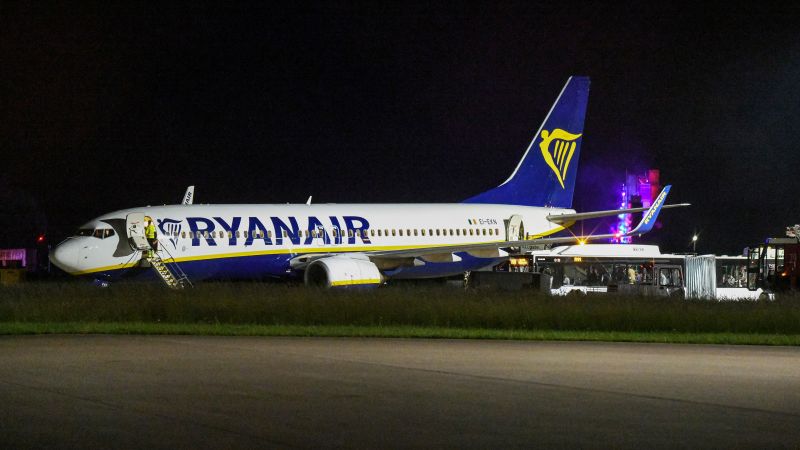Spain Leads The Global Market In A380 Part Reclamation With Ex-Malaysia Airlines Aircraft Now Set For Dismantling In France - Travel And Tour World
Friday, June 6, 2025

Spain has emerged as a key player in the growing A380 scrapping market, with the recent dismantling of an ex-Malaysia Airlines Airbus A380 at Tarbes–Lourdes Airport in France. The aircraft, which had previously served with Malaysia Airlines, is being processed for its valuable components as part of a broader trend in the aviation industry to recycle high-demand parts from retired aircraft. Spain’s Teruel Airport has become an important hub for these efforts, complementing the dismantling activities taking place in France. This collaboration between Spain and France highlights the industry’s shift toward sustainability, as companies increasingly focus on reclaiming and reusing parts to support the ongoing operations of the remaining A380 fleets worldwide. The growing demand for recycled aircraft components is playing a significant role in the future of aviation, and Spain is positioning itself as a critical site for this process.
Setna iO has expanded its fleet of retired Airbus A380s by acquiring another former Malaysia Airlines (MH) aircraft, which is now set for dismantling. The aircraft, currently stored at Tarbes–Lourdes–Pyrénées Airport (LDE) in France, will be disassembled for valuable parts that are in high demand. This acquisition is part of a broader industry trend where A380s, once considered the crown jewels of commercial aviation, are increasingly being retired and scrapped due to declining resale values and a growing need for second-hand aircraft components.
Setna iO remains dedicated to advancing its aircraft recycling efforts, with a particular emphasis on the Airbus A380. The company is focused on assisting active A380 operators by supplying recycled, high-value components from retired aircraft. Their latest acquisition is a retired A380, previously operated by Malaysia Airlines, which still houses three of its four Rolls-Royce Trent 900 engines. This offers Setna iO a valuable opportunity to provide crucial parts to support the ongoing operation of A380 fleets around the globe.
On June 4, Setna iO confirmed the acquisition of this retired A380. The aircraft is set to be disassembled by TARMAC Aerosave, a well-regarded European company specializing in aircraft storage, recycling, and dismantling. TARMAC Aerosave has been instrumental in the teardown process of many other A380s, demonstrating expertise in maximizing the value of used parts and contributing to the sustainability efforts within the aviation industry.
This move is part of a broader trend in the aviation sector where major airlines like Malaysia Airlines are transitioning away from the A380, opting for more fuel-efficient aircraft models such as the Airbus A330-900. Malaysia Aviation Group (MAG) has already completed a deal to replace its A380 fleet with 20 A330-900 aircraft, which includes ten directly purchased from Airbus and ten leased from the Irish company Avolon. The first three A330-900s have already been delivered, with the latest arriving in April 2025.
The increasing number of A380s being decommissioned reflects larger market forces. The Airbus A380, which was once hailed as the future of air travel due to its immense size and capacity, has faced difficulties in adapting to the current aviation landscape. High operating costs, along with shifting market demands for more fuel-efficient and smaller aircraft, have contributed to its gradual retirement. The recent surge in A380 scrapping underscores how quickly the market has changed, with airlines reevaluating their fleets to align with modern travel needs.
Setna iO is not the only player capitalizing on the growing demand for second-hand A380 parts. In April 2025, VAS Aero Services, based in Boca Raton, Florida, was appointed by Airbus to oversee the dismantling and redistribution of parts from three additional A380s. This included MSN 61 and MSN 66, former Lufthansa aircraft, which were stored at Teruel Airport (TEV) in Spain. Both planes, previously registered as D-AIME and D-AIMF, are now set to be stripped for their valuable components.
Another notable aircraft, MSN 84, a retired Malaysia Airlines A380, has been stationed at Tarbes–Lourdes Airport since late 2022, following its relocation from Kuala Lumpur International Airport (KUL). This aircraft, too, is expected to be dismantled, adding to the growing list of A380s retired and recycled by various companies across the world.
By May 2025, a total of 29 Airbus A380 aircraft have been decommissioned and dismantled. This includes high-profile retirements like those of Lufthansa’s MSN 48 (D-AIMD) and MSN 73 (D-AIMJ), both of which were scrapped in May 2025. Lufthansa itself has temporarily reintroduced some A380s into service to cope with delays in Boeing 777-9 deliveries, now expected to be postponed until 2026. This decision has been highlighted in Lufthansa’s 2024 annual report, reflecting the need for large-capacity aircraft in the absence of newer, larger models.
The continuing trend of Airbus A380 retirements underscores the significant challenges the aircraft encounters in the modern aviation landscape. Despite its technical prowess and ability to carry large numbers of passengers over long distances, the A380 struggles with high operating costs. The industry’s pivot toward smaller, more fuel-efficient aircraft models, especially in the wake of rising environmental awareness and fluctuating fuel prices, has made the A380 less appealing for many airlines.
While some airlines, such as Lufthansa, have brought a few A380s back into service temporarily, the long-term viability of the aircraft remains in question. Airlines are increasingly opting for newer, more flexible models that can adapt to the changing needs of global air travel, from the rise of low-cost carriers to the increased demand for regional flights.
The continued scrapping of A380s, coupled with the efforts of companies like Setna iO and VAS Aero Services, highlights the shift in the aviation industry toward sustainability and resource efficiency. By recycling valuable components, these companies are playing an essential role in extending the A380’s legacy in a more environmentally responsible way. The parts salvaged from retired A380s will continue to support the operation of the remaining aircraft in service, ensuring that the iconic airliner contributes to global aviation even after its retirement.
Spain has become a central hub for A380 dismantling, with an ex-Malaysia Airlines aircraft now set for recycling at Tarbes–Lourdes Airport in France. This move highlights the growing trend of reclaiming valuable components from retired aircraft as part of global efforts to support active fleets and promote sustainability.
The fate of the Airbus A380 serves as a reminder of the ever-evolving nature of the aviation industry. While its future in the skies may be uncertain, the aircraft’s parts will continue to have a significant role in maintaining the operational fleets of airlines around the world. Through strategic recycling efforts, Setna iO, VAS Aero Services, and other companies in the industry are helping to ensure that the legacy of the A380 lives on through its components, providing continued value to the aviation sector for years to come.











